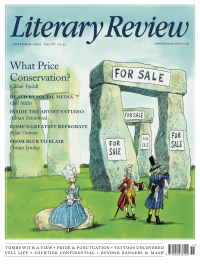Emma Garman
And Then There were Eight
Strega
By Johanne Lykke Holm (Translated from Swedish by Saskia Vogel)
Lolli Editions 180pp £14.99
‘In every woman’s life, there’s someone waiting at the gate,’ reflects Rafa, the nineteen-year-old narrator of Johanne Lykke Holm’s Strega. ‘We are all candidates, but only some of us are chosen.’ Rafa is referring to murder, a possible fate always hovering over women. But instead of telling yet another story revolving around a female corpse, Strega is altogether more original. Its subjects are the ingenuity and perversion forged in the face of this omnipresent threat. Strega, Italian for witch, is also the name of an eighty proof herbal liqueur made since 1860 in the city of Benevento, a witches’ gathering place according to folklore. There can be no better symbol for this brief and headily bittersweet novel.
Lykke Holm’s Strega is a fictional Alpine village, where passengers alight from the train for the once fashionable Hotel Olympic. Overlooking a black lake in an isolated valley, the Olympic has a faded red facade and proportions that seem ‘wrong … like a doll’s house’. Here Rafa and eight other teenage girls arrive in late summer to train as maids. Lykke Holm renders the era and country vague, the better to create a gothic atmosphere. The girls sleep in a dormitory, ‘hair sweeping across the pillows, like black shawls’, and a cadre of older women put them to work scrubbing and polishing, making beds, doing laundry, even picking fruit. But, Rafa observes in an echoing refrain, ‘no guests arrived’.
Nearby is a convent, which is both a mirror of the Olympic’s cloistered female environment and its antithesis. At the hotel, girls are disciplined into useful drudges, maintainers of a gendered status quo. The nuns’ lives, masochistic yet conspicuously free of the usual demands placed on women, hold ‘a

Sign Up to our newsletter
Receive free articles, highlights from the archive, news, details of prizes, and much more.@Lit_Review
Follow Literary Review on Twitter
Twitter Feed
The era of dollar dominance might be coming to an end. But if not the dollar, which currency will be the backbone of the global economic system?
@HowardJDavies weighs up the alternatives.
Howard Davies - Greenbacks Down, First Editions Up
Howard Davies: Greenbacks Down, First Editions Up - Our Dollar, Your Problem: An Insider’s View of Seven Turbulent...
literaryreview.co.uk
Johannes Gutenberg cut corners at every turn when putting together his bible. How, then, did his creation achieve such renown?
@JosephHone_ investigates.
Joseph Hone - Start the Presses!
Joseph Hone: Start the Presses! - Johannes Gutenberg: A Biography in Books by Eric Marshall White
literaryreview.co.uk
Convinced of her own brilliance, Gertrude Stein wished to be ‘as popular as Gilbert and Sullivan’ and laboured tirelessly to ensure that her celebrity would outlive her.
@sophieolive examines the real Stein.
Sophie Oliver - The Once & Future Genius
Sophie Oliver: The Once & Future Genius - Gertrude Stein: An Afterlife by Francesca Wade
literaryreview.co.uk